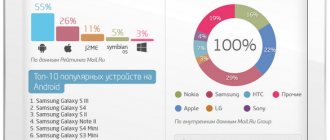Subscribe to news:
MVNO (Mobile Virtual Network Operator) is a company that sells cellular services to the end consumer, but does not have its own infrastructure to provide such services. Depending on the business model, a specific virtual operator may have only part of the necessary infrastructure (for example, radio subsystems, like Yota) or no infrastructure at all. Like, say, operators of “tourist” SIM cards.
The number of subscribers of virtual operators in Russia at the end of the first half of 2021 reached 6 million people, the researcher calculated. And the main growth, analysts say, has occurred in the last two to three years.
The emergence and widespread use of MVNOs by telecom operators is the main sign of the saturation and maturity of the cellular communications market. This means that the base operators have already mastered all the market niches they have found. But at the same time, they have free network resources that they are ready to sell cheaply in bulk to other companies. And they, in turn, sell them more expensively at retail.
Yaroslav Dubovikov, executive director of the United Telecommunications Corporation (OTK communications operator): “Despite the fact that just a few years ago the topic of virtual operators was not taken seriously, the current pace of development in this area, when every year we see the emergence of dozens of new MVNO projects, speaks of their demand."
So, we present an overview of the most popular domestic MVNO telecom operators.
Virtual operators working on Tele2 networks
The telecom operator Tele2 was formed in 2001 by the Swedish group Tele2 AB based on network equipment purchased in the Russian Federation. The company provides its services in 60 constituent entities of the Russian Federation. The company is successfully developing among leading operators, providing its subscribers with fairly good communications at low prices.
Tele2 is rapidly progressing in the MVNO field. Thus, according to Maxim Mitkin (CEO of the company), there are currently 18 virtual mobile operators operating on Tele2 equipment, which include Rostelecom, Sberbank (Sbermobile), Virgin Connect, MCN Telecom, TTK, Easy4, V- Tell, Tinkoff Mobile and a number of others.
Er-telecom
ER-Telecom (Dom.ru) is a leading independent federal provider of telecommunications services. Provides services such as cable and HD television, broadband Internet access, mobile and landline telephone communications.
Together with the company Tele2, MVNO began working in networks at the end of 2015. But the cooperation was not successful, since the prices for tariffs were not attractive to potential subscribers.
Telephone services were discontinued in September 2021.
Rostelecom
Public company Rostelecom is one of the largest telecommunications companies in the Russian Federation and neighboring Europe. Since 2021 Operates on the Tele2 platform as a virtual provider.
The operator is at the top of the rankings in the domestic market for broadband access services and commercial television broadcasting: the audience of service consumers is 13 million, and Rostelecom’s commercial television is 10 million viewers, of which more than 5 million are viewers of the new media product “Interactive TV”.
Rostelecom is a leading player in the market of telecommunications products for the Russian government and commercial subscribers at all levels.
In July 2021, the number of Rostelecom MVNO users reached 500,000. Rostelecom managed to gain such a base during eight months of MVNO operation on the networks of T2 RTK Holding (Tele2 brand).BBB-”, as well as the Standard & Poor’s agency at the “ BB+.”
SberMobile
SberMobile is a virtual operator that uses the infrastructure of the Tele2 network.
The range of SberMobile tariffs is very diverse. Each subscriber can set up their own tariff based on personal preferences. The most economical one is available at a price of 200 rubles, it includes 150 minutes of calls and 3 GB of network traffic in Russia. The Premium tariff plan includes 1,500 minutes of communication and 30 GB of network traffic, its price is 1,150 rubles per month. There is a limit for free SMS – it is 50 messages. By paying extra, you can get unlimited access to various instant messengers and social networks.
For the company's subscribers who are Sberbank card holders, there is a “Thank you” bonus program. For paying for communications through the bank's app, clients receive cashback of up to 20%. There is also a Wi-Fi calling feature that allows you to stay connected even when the signal is low.
Tinkoff Mobile
This telecom operator began operating in December 2021. Rents a platform from Tele2. Tinkoff Mobile sells SIM cards in more than 15 regions of Russia. Tinkoff Mobile has a number of advantages. For example, a subscriber can set up his own tariff, which is convenient only for him, choosing any number of minutes or gigabytes of Internet.
The operator offers a number of bonuses:
- Several SIM cards can be linked to one account, which is very convenient.
- Owners of plastic cards of the bank of the same name receive cashback of up to 30% for communication payments, and for a positive balance on the card over 1000 rubles - 6% per annum per month.
- Gives 1000 rubles to the account of all new subscribers.
DANYCOM
Ceased to exist.
Communications operator DANYCOM launched in June 2021. The main office is located in Krasnodar. One of the few operators that can boast of a total absence of roaming in Russia. The subscriber card has maximum coverage. Where Tele2 communication does not exist, the operator automatically switches the subscriber to another partner tower. DANYCOM offers its subscribers a “Free” tariff, which allows you to communicate economically.
The operator is a partner with more than 100 communication providers, including at the international level. Thanks to this, calls abroad remain cheap.
TransTeleCom
TransTeleCom began its activities in MVNO in Rostov in 2017.
TTK is one of the top five leading domestic communication operators. The main shareholder of TTK is JSC Russian Railways, the percentage of assets owned is 99.99%. TransTeleCom is a provider of backbone communication services for leading operators and large associations, the range of which extends over more than 78,000 km. The number of TTK subscribers reaches almost 2 million.
TTK has connections with networks of neighboring countries, including China, Finland, the Baltic region and the CIS. This is the optimal route between Europe and Asia.
EASY4
The opening of the Easy4 mobile provider took place in June 2021 at the Startup Village conference for startups in Innovative.
EASY4 SIM cards are equipped with Multi-IMSI technology, that is, several numbers can be recorded on one SIM card. The company offers quite favorable tariffs for its subscribers. The main emphasis is on long-distance communication. Few of EASY4's competitors can boast of free incoming calls in absolutely any country. At the same time, the cost of outgoing calls to other countries is only 2 rubles/min. The price of Internet traffic is 10 kopecks per 1 MB.
Multi-IMSI allows you to choose the connection of any of the Big Four partners with optimal reception and this is an innovation in Russia.
In October 2021, the FSB approved the sale of eSIM with the ability to switch between telecom operators.
How to add an APN access point?
An APN access point is added automatically by the operator. You receive an SMS with the Internet access configuration and mms. All you need to do is apply/save the settings.
But sometimes you need to configure the access point manually. Let's look further at how to do this.
Open Settings – Network and Internet – Mobile network – Access points (APN) . Click on the plus sign (add).
- Access point name.
- APN.
- Proxy.
- Port.
- Username and password.
- Server.
- MMSC.
- MMS proxy server.
- MMS port.
- MCC – time in milliseconds..
- Authentication type (none, PAP, CHAP).
- APN type.
- APN protocol (IPv4 or IPv6).
- APN protocol in roaming (IPv4 or IPv6).
- Channel (LTE, Edge, gprs and others).
- MVNO type. (SPN, IMSI, GID, PNN).
Most of the settings are not needed at all and are not used by Russian operators. And since the APN setup process takes place automatically (and not as it was 5 years ago), there is no point in bothering with and remembering all the settings.
We are talking about MVNO - this abbreviation stands for Mobile Virtual Network Operator - virtual cellular operator. The essence of their work is very simple: they provide services without having their own cellular network, but by renting it, for example, from the same “Big Three”. The fact is that every “full-fledged” operator’s network capabilities for servicing subscribers are always somewhat higher than these subscribers actually have. That is, there is a certain idle resource that can be sold for some money: this is better than if it remains unclaimed by anyone.
Of course, operators will also not sell their network resource at a loss, but MVNOs make money by buying this resource (i.e. traffic) wholesale and selling it retail to ordinary subscribers: the scheme is simple.
Operators working on Beeline networks
Beeline is one of the Big Four operators. Part of the VEON Ltd group of companies, which provide communications throughout the world.
Let's consider virtual operators working on the Beeline network platform.
Mobilink
The company has existed since 2014. Mobilink provides communication services throughout Russia. The goal of the project is to create the best conditions for potential and existing subscribers. For example, SIM card compatibility with any phone, no roaming between countries. The operator also offers its subscribers payment in Mobilink tokens, which can be transferred to other cryptocurrencies on the Mobilink exchange and wallet.
Sim Sim
Virtual telecom operator Sim Sim was formed in 2014. The main orientation of Sim Sim is calls to the CIS countries, Israel, India, Vietnam, China, USA, Egypt and European countries at a price of 1.5 rubles/min, calls within the Beeline network are unlimited. For foreigners, a special 24-hour support service has been developed in different languages, as well as a service that helps guests in resolving various issues.
Atlas
The company began its work in 2021. A special bonus program has been created for operator users that allows them to earn and spend Atlases. Atlases are accumulated for attracting friends to the company, for downloading partner applications and their direct use. And you can spend them directly on communication. Every month Atlas gave its customers pleasant gifts in the form of free service packages.
In October 2021, the Atlas operator closed.
Teletai
The company began its activities as a virtual operator in the Russian Federation in 2012. At the moment, the company successfully operates in more than 20 regions. The main work is based on the provision of telecommunications services for business companies. There is also a range of different tariffs at affordable prices.
How to increase the Internet speed of Yota 4G, Megafon, MTS and Beeline?
Let's first talk about the popular Iota. In order to correct this sad situation, it is necessary:
- Go to “Settings > SIM cards and mobile networks > Operator name (Yota, Megafon, MTS, Beeline) > Access points > Operator name
and select “LTE” or “4G” as the data transfer standard in the “Owner” section
Next, we go to the access point settings and register client.yota.ru as the APN, instead of yota.ru, internet.megafon.ru instead of internet for Megafon, client.mts.ru instead of internet.mts.ru for MTS, home.beeline. ru for Beeline - incorrect values could be set when automatically receiving settings from the operator.
Since Yota is a virtual operator, for it we change the “MVNO Type” to IMSI. For other operators, nothing needs to be specified in this paragraph. Then save the settings and reboot the phone.
Virtual operators of the MTS network
MTS mobile networks are among the oldest in the post-Soviet space. They were formed on the basis of open frequencies for military and civil air navigation in 1993. By 2021, MTS is one of the industry leaders, providing communication services to more than 105 million subscribers.
MGTS
PJSC Moscow City Telephone Network (MGTS) began operating as an MVNO in 2014 after receiving a license (2013).
The service package combines digital TV, mobile communications, broadband Internet access, and fixed telephony. The company also provides video surveillance and security alarm services and other household services.
MGTS subscribers have the opportunity to analyze the parameters and quality of communication online, as well as remotely monitor the volume of services provided.
What do we know about accelerating mobile Internet?
But not all smartphones and not all mobile operators support this option. To find out if your phone supports 4G+, you need to install the Network Signal Guru program (requires Root access rights). Information on the operator’s work in this mode should be clarified on its official website.
However, even with a happy coincidence of these two initial data, the signal may be very unstable and the speed may not correspond to the declared one.
In general, the speed of the mobile Internet depends on the correct settings of the access point on your phone, the strength of the network signal at your location, as well as the time of day - in the evening, when everyone is hanging out on the Internet, the speed will drop.
Virtual operators on Megafon networks
One of the Big Three operators, operating in the telecommunications services market since 1993. It has the most modern and powerful equipment in Russia and a stable coating. All this provided opportunities for the development of virtual networks based on Megafon.
Yota
The corporation was formed in 2007. In 2014 began its active work selling cards based on Megafon. The cost of tariff offers varies within standard prices across the country. The quality of the services provided is quite high, with an extensive coverage map. The main feature of the operator is unlimited communication between Yota subscribers. The average monthly cost is 550 rubles. In September, the company launched a new project for tablet gadgets, allowing unlimited use of some applications.
Gars Telecom
This MVNO has existed for subscribers since 2003. Currently it operates on Megafon network equipment. It provides its services to clients in Moscow and St. Petersburg. The development trend is in the B2B segment. This is the area of office, hotel, and industrial real estate. Gars Telecom provides full cycle telecom services: fixed and mobile communications, Internet access, creation and rental of channels and infrastructures and many others. Network subscribers note the speed of work of managers in connecting, budget tariffs for both individuals and legal entities, and good uninterrupted Internet.
NETBYNET
The company began its cooperation with Megafon in 2011. Geographically, the operator is located in seven districts of the Russian Federation: Central, Northwestern Federal District, Southern, Volga, Ural, Far Eastern and North Caucasian Federal Districts. The number of network subscribers is more than 800 thousand.
NETBYNET offers its customers a wide range of services for home and office. These include broadband access to the Internet, telephony, and digital television. There is also a specially developed application for unlimited Internet Wifire TV, which is available on IOS and Android platforms.
NETBYNET in 2021 entered into a contract with MosGorTrans to connect transport infrastructure with Wi-Fi to the Internet for passengers.
5G frequency bands
| Band | Uplink | Downlink | Duplex |
| n1 | 1920 – 1980 MHz | 2110 – 2170 MHz | FDD |
| n2 | 1850 – 1910 MHz | 1930 – 1990 MHz | FDD |
| n3 | 1710 – 1785 MHz | 1805 – 1880 MHz | FDD |
| n5 | 824 – 849 MHz | 869 – 894 MHz | FDD |
| n7 | 2500 – 2570 MHz | 2620 – 2690 MHz | FDD |
| n8 | 880 – 915 MHz | 925 – 960 MHz | FDD |
| n20 | 832 – 862 MHz | 791 – 821 MHz | FDD |
| n28 | 703 – 748 MHz | 758 – 803 MHz | FDD |
| n38 | 2570 – 2620 MHz | 2570 – 2620 MHz | TDD |
| n41 | 2496 – 2690 MHz | 2496 – 2690 MHz | TDD |
| n50 | 1432 – 1517 MHz | 1432 – 1517 MHz | TDD |
| n51 | 1427 – 1432 MHz | 1427 – 1432 MHz | TDD |
| n66 | 1710 – 1780 MHz | 2110 – 2200 MHz | FDD |
| n70 | 1695 – 1710 MHz | 1995 – 2021 MHz | FDD |
| n71 | 663 – 698 MHz | 617 – 652 MHz | FDD |
| n74 | 1427 – 1470 MHz | 1475 – 1518 MHz | FDD |
| n75 | N/A | 1432 – 1517 MHz | SDL |
| n76 | N/A | 1427 – 1432 MHz | SDL |
| n77 | 3.3 – 4.2 GHz | 3.3 – 4.2 GHz | TDD |
| n78 | 3.3 – 3.8 GHz | 3.3 – 3.8 GHz | TDD |
| n79 | 4.4 – 5.0 GHz | 4.4 – 5.0 GHz | TDD |
| n80 | 1710 – 1785 MHz | N/A | SUL |
| n81 | 880 – 915 MHz | N/A | SUL |
| n82 | 832 – 862 MHz | N/A | SUL |
| n83 | 703 – 748 MHz | N/A | SUL |
| n84 | 1920 – 1980 MHz | N/A | SUL |
| n85 | 2496 – 2690 MHz | N/A | SUL |
| n257 | 26.5 – 29.5 GHz | 26.5 – 29.5 GHz | TDD |
| n258 | 24.25 – 27.5 GHz | 24.25 – 27.5 GHz | TDD |
| n260 | 37 – 40 GHz | 37 – 40 GHz | TDD |
Combined virtual operators
This category includes such virtual operators that rent capacity and equipment from several large companies providing communication services.
MATRIX mobile
MATRIX Telecom LLC is one of the first virtual operators in Russia, founded in 2003. At the moment, the radiotelephone operator operates on the platforms of the MegaFon, VimpelCom (Beeline brand) and Tele2 networks. Coverage map - Moscow and Moscow region.
The operator offers a range of services aimed at private clients and legal entities. There is a varied range of tariffs designed for calls within Russia and around the world.
Aiva-Mobile
The company began its activities as an MVNO in 2014 on the platform of the Tele2 networks in Moscow and St. Petersburg. The range of tariffs is focused on calls within Russia and the CIS.
Aiva-Mobile offers its customers a card with two numbers linked, which is not only convenient for long-distance communication, but also much cheaper than other operators. The company is working to expand its coverage map, and also enters into contracts with other countries for cooperation in order to create low-cost roaming.
A full-fledged cellular operator infrastructure has been created for Aiva Mobile, including a billing system, its own GMSC switch, HLR system, data channels and other technical components.
Gazpromtelecom
Gaztelecom is a combined operator created in 2013. Works on network platforms of leading Russian operators. It has a fairly wide coverage map. Gazprom is seeking to transfer all employees to MVNO Gaztelecom, and their number is about half a million. Offers its subscribers a smooth transition by maintaining their phone number or purchasing a new one. The range of tariffs is varied, starting from 100 rubles. up to 2000 rub.
How easy is it to start an MVNO?
Now so many companies are launching virtual operators that it seems very easy. So, to open their virtual operator, companies go through a number of stages:
- Preparation. This is the initial stage in which a business plan is prepared. It evaluates the financial capabilities and profitability of the launched project. If there is no client base, then you should consider a strategy for attracting it.
- Conclusion of an agreement. At this stage, you need to decide on the reference operator. You will need to sign an agreement that will stipulate: prices for traffic, obligations of the two parties.
- Billing and equipment. You will need to decide on the billing usage model and equipment. After choosing, sign a lease agreement for the equipment.
- Integration. You will need to integrate with the infrastructure of the selected operator. The process may take 2-3 months. Costs for carrying out are in the range from 2 to 5 million rubles.
- Testing. After all work has been carried out, it is necessary to test the quality of communication. Any errors that occur must be corrected.
- Launch. When working correctly, the operator offers services to citizens.
The entire procedure for launching a virtual operator can take from 5 to 8 months. As for the starting capital, the minimum amount for opening is about 50 million rubles.
SberMobile
Sberbank turned out to be the most accurate operator of all: only they take into account the calendar month, and not the conventional 30 days.
In addition, the company offers a wide range of additional services that become free with certain monthly expenses - from free social networks to automatic cashback.
Cashback with “Thank you” bonuses is returned: when paying over 300 rubles. - 10%; from 400 rub. - 15%; from 500 rub. — 25%; from 800 rub. - thirty%. IMPORTANT - the cost of additional packages is not taken into account in this case.
The list of free services for connection includes:
- social networks - Facebook, Vkontakte, Odnoklassniki, Instagram, Twitter (package);
- instant messengers - WhatsApp, Viber, Facebook Messenger, Skype (package);
- audio services - Apple Music, Yandex.Music, Google Play Music, Shazam (package);
- video services - RuTube, Twitch, YouTube (package).
| Unlimited Internet: – Unlimited calls: – Unlimited SMS: 50 rub. Unlimited messengers: 49 rub. / 0 on tariffs from 300 rub. Unlimited music: 99 rub. / 0 on tariffs from 400 rub. Unlimited social networks: 69 rub. / 0 on tariffs from 500 rub. Unlimited video: 199 rub. / 0 on tariffs from 800 rub. Modem mode: not charged Cost per minute, min: 0.33 rub. Cost per minute, max: 0.67 rub. Cost per minute, min: 16.5 rub. Cost GB, max: 25 rub. |
Tinkoff
Tinkoff, in accordance with its traditions, offers an original service with services that cannot be found with other operators.
The offers of a virtual operator for traveling abroad and a bonus of 1000 rubles look very interesting. for the transition. In addition, this is the only OpCoS that offers emulation of the existence of a second SIM card.
Unfortunately, the connection is only available in a number of regions. Despite this, packages are valid without restrictions throughout the Russian Federation, with the exception of Crimea and Sevastopol.
The list of free services for connection includes:
- messengers - WhatsApp, Viber, Facebook Messenger, iMessage, Tam Tam, imo.im (package);
- audio services - Apple Music, Yandex.Music, Yandex.Radio, Google Play Music, Soundcloud, Boom, Zvooq, Deezer Music, Shazam, Spotify (package);
- video services - Youtube, Twitch, iTunes Video, Google Play Movies, YouTube Kids, Rutube, Vimeo (package).
| Unlimited Internet: 999 rub. Unlimited calls: 999 rub. Unlimited SMS: 59 rub. Unlimited messengers: 59 rub. Unlimited music: 59 rub. Unlimited video: 159 rub. Modem mode: 499 rub./month Cost per minute, min: 0.25 rub. Cost per minute, max: 0.5 rub. Cost per minute, min: 22.5 rub. Cost GB, max: 50 rub. |










